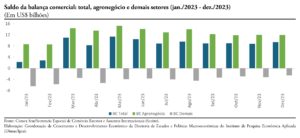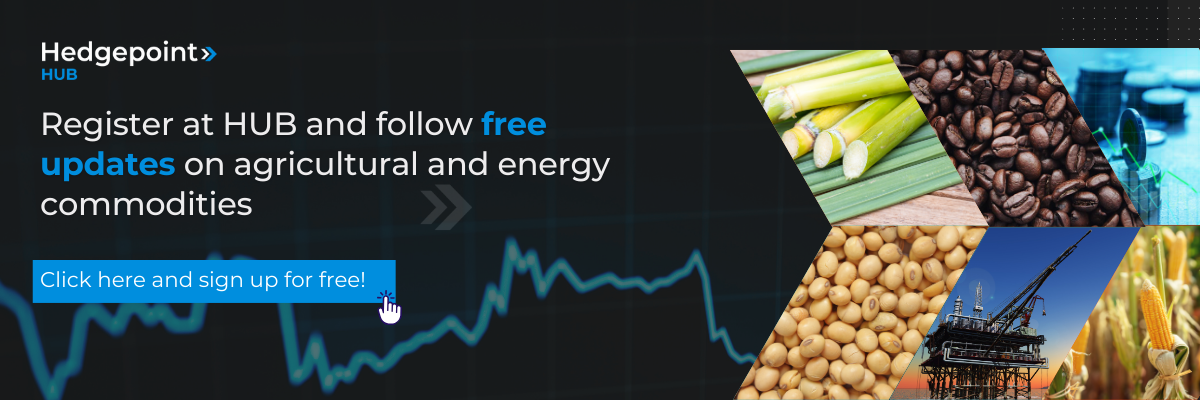Brazil's trade balance: understand the importance of commodities
Brazil’s trade balance influences the country’s entire economy.
In this sense, commodities are an essential part of Brazilian exports and play an important role in the country’s Gross Domestic Product (GDP).
In March alone, commodities accounted for 70% of exports. According to the Ministry of Agriculture and Livestock (MAPA), the quantum index, which measures the evolution of the volume of products that make up international shipments, rose by 14.6%.
Contrary to what one might think at first glance, this increase was not due to the production of grains such as soybeans and corn. The highlights were sugar, cotton and green coffee.
In a context where the balance of trade is mostly made up of commodities, how does Brazil benefit from the boom cycle in this sector? In this article, you’ll find out. Have a good read!
How important is the commodities market in Brazil’s trade balance?
In 2023, Brazil’s foreign trade achieved historic records and a trade balance close to US$ 100 billion. Exports reached a figure of US$ 339.67 billion, an unprecedented result that exceeded the 2022 figures by 1.7%.
The volume exported increased by 8.7%, with prices falling by 6.3%. Imports, meanwhile, ended the year down 11.7% and with a balance of US$ 240.83 billion. One of the positive surprises was the oil and oil products sector, which reached a record surplus of US$ 25 billion in 2023, 20% higher than in 2022.
However, agribusiness continues to be one of the most significant and fundamental segments of the Brazilian economy. The sector achieved an accumulated surplus of US$ 148.58 billion, an increase of 4.9% from the previous year. Exports totaled US$ 165.05 billion.
The share of agribusiness in total exports from January to December 2022 reached 48.6%, as shown in the graph below.

These figures prove the extremely important role of the commodities market in Brazil. According to information from the Ministry of Development, Industry, Trade and Services (MDIC), agriculture and the extractive industry were mainly responsible for the increase in exports.
The products with the highest increase in foreign sales were:
- Live animals.
- Iron ore.
- Animal feed.
- Civil engineering installations and equipment.
How does the commodities market influence Brazil’s trade balance?
The commodities market has a significant impact on Brazil’s trade balance due to its large share of product exports. After all, the country is one of the world’s largest producers and exporters of commodities such as soy, coffee, sugar, animal protein, iron ore, and oil.
Variations in the prices of these commodities therefore directly affect the performance of Brazil’s trade balance. For example, when commodity prices are high on the international market, Brazil’s export earnings can increase. This leads to a positive trade balance.
The Real, the country’s currency, also influences Brazil’s exports. Its appreciation makes Brazilian products more expensive than those from other countries, while its devaluation makes them more competitive.
In addition, a drop in international prices can reduce export revenues and, consequently, have a negative impact on the trade balance. In addition, global demand for commodities is influenced by macroeconomic, climatic, and geopolitical factors, such as economic growth and the trade policies of other countries.
Therefore, events such as economic recessions in major commodity consumers or changes in the trade policies of importing countries can affect demand. As such, Brazil runs the risk of suffering a decline in exports.
Who are the biggest buyers of Brazilian commodities?
In 2023, the main destination for Brazilian exports was China. Shipments to the Asian giant totaled US$ 105.75 billion, an increase of 16.5% compared to 2022. It was the first time that exports to a single partner exceeded the US$ 100 billion mark.
Other highlights were Argentina, with an increase of 8.9% compared to 2022, which totaled US$16.72 billion. For the United States and the European Union, historically important destinations, there was a drop of 1.5% and 9.1%, respectively.
Read also:
- How do commodity logistics boost Brazil’s competitiveness?
Brazil: strength of agribusiness boosts positive trade balance results
The succession of trade balance records has a reason: agribusiness. Alongside this, the country is also seeking to diversify Brazilian trade.
In general, the Chinese market plays a leading role for Brazil through the purchase of commodities. The figures reinforce the importance of this sector in achieving a positive trade balance. After all, soybeans, iron ore, and oil together account for 37.2% of exports.
In this sense, Brazil’s ability to produce and export commodities on a large scale, combined with its strategic geographical position and natural resources, strongly influences its trade performance. This highlights the power of agribusiness for the entire Brazilian economy.

Hedgepoint: risk management for the Brazilian commodities market
Hedgepoint works with risk management for agricultural and energy commodities. In a volatile market, with constant variations in supply and demand, having hedging instruments makes the difference.
As such, we act to protect businesses from volatility. In Brazil, this is a crucial factor for the nation’s entire economy. The country depends on commodities. In other words, falls in production can impact the entire trade balance.
With market intelligence, data analysis, and an educational platform, Hedgepoint contributes to business decision-making. We train our partners and offer hedging tools that suit the particularities of each market, with sophisticated financial instruments.
Access the Hedgepoint HUB and find out how we can help your business. Try it 1 month free!







